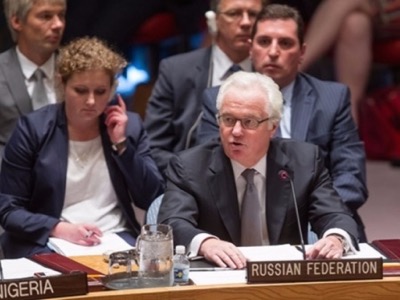
The Security Council met on 8 October 2016 to debate not only the Franco-Spanish proposition for a Resolution concerning Syria, but also a Russian counter-proposition. Without surprise, the two texts were rejected by vetos – by Russia for the first, and by the Atlantist block for the second.
It is the first time in the history of the Council that such a situation has presented itself.
The French proposition was aimed at preventing Syria and Russia from applying Resolution 2249 which «…. asks all member states (…) to redouble their efforts and coordinate their actions in order to prevent and suppress acts of terrorism committed in particular by the EIIL (Islamic State of Iraq and the Levant), also known as Daech, as well as by the Al-Nusra Front, and all other individuals, groups, businesses and entities associated with Al-Qaïda». In contradictory fashion, the French text referred to the Russo-US agreement concerning the cessation of hostilities (according to which the United States undertook to separate the moderate rebels from the extremist jihadists), while at the same time forbidding the bombing of the extremists, and also imposing a no-fly zone not only over East Aleppo, but also West Aleppo.
The Russian proposition also referred to the cessation of hostilities agreement, but saluted the application of Resolution 2249 against the jihadists.
Closing the episode of the cessation of hostilities, the Jund al-Aqsa group (an off-shoot of Al-Qaïda; and therefore considered by all as «extremist») has officially joined the Jabhat Fateh al-Cham (a new title for the Al-Nusra Front after its mutually agreed separation from Al-Qaïda).
Blaming NATO, the Russian representative Vitali Tchourkine heckled his colleagues, declaring - «The permanent representative of the United Kingdom has just pathetically shouted "Stop now!" He’s right. You must immediately stop supporting all sorts of riff-raff all over the world, whether they are extremists, terrorists or any other groups who amuse themselves by destabilising the situation in one country or another. Generally speaking, stop sticking your noses into the affairs of other sovereign states, give up your colonial habits, and leave the world in peace. That would help to clean up the situation in several areas of the world».
From his side, the representative from Syria, Bachar Jafari, continued - «For the last six years,the United States, France and the United Kingdom have been referring to the Council in one session after another, sponsoring projects for declarations which are only intended to confuse public opinion and give the impression that they are seeking to solve the crisis in my country».
China voted for the Russian proposition, but preferred to abstain rather than oppose its veto to the French proposition.
These crossed vetos sparked discussion, loosening the tongues of many political representatives, such as the German Minister for Foreign Affairs, Frank-Walter Steinmeier. In an interview with Bild, he warned his compatriots of the risk of World War.
However, no-one in Syria believes that Washington will follow through with its threats to bomb the country, or at least its army. The liberation of Syria continues, in particular with the progressively evident retreat of the jihadists in Aleppo.
Simultaneously, the situation in Iraq has become increasingly tense. Baghdad does not seem to be on the same wavelength as the International anti-Daesh Coalition concerning the liberation of Mosul, which is currently occupied by the jihadists. Turkish President Recep Tayyip Erdoğan sowed a number of explicit unspoken messages on the Saudi TV channel RotanaTV (property of Prince Walid Ben Talal, the unofficial Saudi ambassador in Israël). Then, repeating his comments to the Turkish daily Sabah, he announced that once Mosul was liberated from the jihadists, its population would remain the same as it was after the ethnic cleansing perpetrated by Daesh - in other words, exclusively Sunni. Besides this, he stated that despite the opposition from Baghdad, Turkey would be maintaining its troops in place, because it had historic rights to the city.
Many Iraqis have interpreted these uncompromising declarations as the announcement of a possible Turkish occupation of the city, following its occupation by Daesh.
In Sanaa, an unidentified missile killed 140 Yemenis who had come to celebrate the period of mourning for the father of the Minister for the Interior. General Jalal al-Rouichene had been nominated to this post by President Abd Rabbo Mansour Had. He remained at his post in the government set up by the Houthi revolutionaries, and is thus considered a traitor by the Saudis. Suspected to have been the origin of the attack, Saudi Arabia denied its implication, and affirms that it did not bomb Sanaa on that day. But the communiqué from Riyadh does not exonerate Saudi Arabia’s allies, who are also participating in the war on Yemen.

 Articles by this author
Articles by this author Send a message
Send a message















Stay In Touch
Follow us on social networks
Subscribe to weekly newsletter